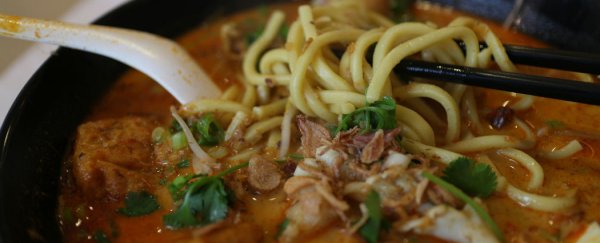There's some encouraging news for those of you who enjoy a curry on a Friday or a Saturday night: research from China suggests that adding a regular spicy meal to your diet can reduce the risk of mortality. The study was extensive in its scope - close to half a million people were surveyed - and the difference was substantial.
The research was carried out over a period of seven years and involved 487,375 participants keeping track of how much spicy food they were eating. The responses were "never" or "almost never", "only occasionally", "one or two days a week", "three to five days a week", or "six or seven days a week". On average, those who ate spicy food six or seven days a week had a 14 percent lower mortality risk than those who never or almost never ate it; for those who had it once or twice a week, the reduction was 10 percent.
This isn't conclusive proof that there's a link between a hot curry or two and longer life, because other factors can't be ruled out. Spicy food eaters tended to live in more rural areas, for example, and it could also be possible that some other accompanying food is the real reason for the discrepancy. Nevertheless, it's something to bear in mind the next time you're making a choice from a restaurant menu.
It's not the first time scientists have suggested a link between health benefits and chillies, which have been variously promoted as antioxidant, anti-inflammatory, and anti- cancer agents down the years. However, no one has yet put together a truly scientific, laboratory-controlled experiment into the effects of spicy food - something that may now happen thanks to the newly published research.
The study was controlled to take into account factors such as family medical history, age, education, diabetes, smoking, and many other variables, though there's still not enough yet to make a 'causal inference' - that is, to say that hot and spicy foods can definitely help to avoid death for longer.
"Consumption of spicy foods may be correlated with other dietary habits and lifestyle behaviours," explains the report, published in the BMJ. "For example, in Chinese cuisine the cooking of chilli pepper and the production of chilli sauce and oil usually requires more oil, and intake of pungent foods may be accompanied by an increased intake of carbohydrate-rich foods such as rice to relieve the burning sensation."
"Further prospective studies in other populations would be essential to demonstrate generalisability of these findings," concludes the report. "More evidence will lead to updated dietary recommendations and development of functional foods, such as herbal supplements."
